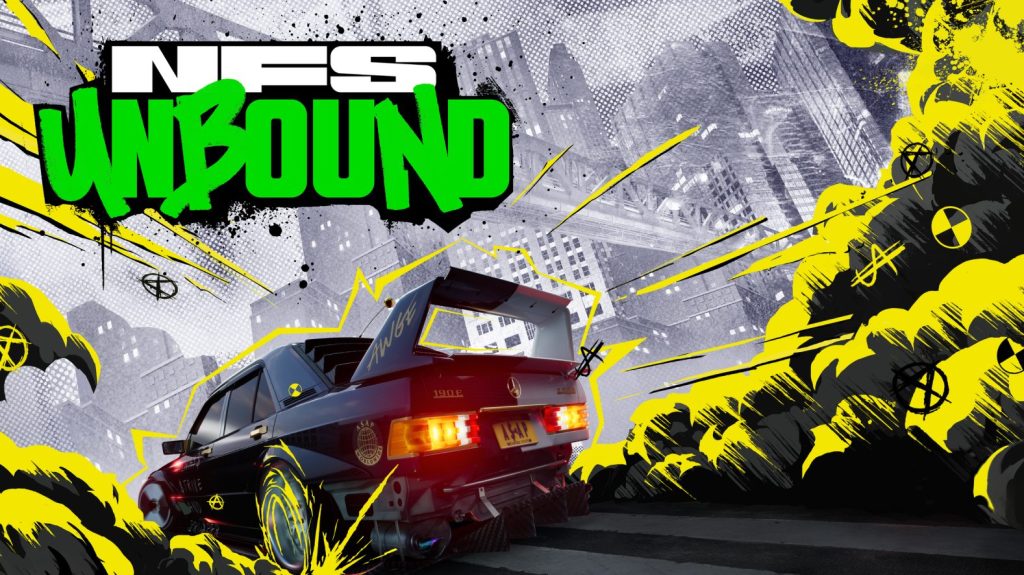
Like a sleeper car with a highly tuned engine under the hood pulling up to the starting line, Need for Speed: Unbound arrived with almost no hype, despite developer Criterion returning for the first time since 2012. Leading up to its launch there had hardly been any marketing and review codes weren’t handed out until launch day, usually an ominous sign that the publisher either doesn’t have any faith in the game or that there are some big issues. But just like that sleeper car sitting on the line, when the flag drops Need for Speed: Unbound unleashes all that hidden potential. It’s not the best racer out there, but it’s the best game in the series for a long time and a lot of fun. Provided you can put up with the horrendous story, that is.
2019’s Need for Speed: Heat didn’t exactly set new records or anything but it did manage a Metacritic score of 74 and was generally liked by fans, stabilising a series that has limping around the track for years setting lap times that put it damn near last. Ghost Game’s reward for creating 4 Need for Speed games was to get retooled into an engineering studio for EA and for most of its staff to be shifted to other studios or let go entirely. EA then handed Need for Speed back to Criterion, who previously did both Need for Speed: Most Wanted and Need for Speed: Hot Pursuit, the first of which is absolutely terrific. Oh, and a little franchise called Burnout. But surprisingly, rather than tossing Heat out of the nearest window, Criterion has actually kept a lot of Heat’s chassis intact, focusing instead on replacing some of the dented bodywork.
I can’t review Need for Speed: Unbound and not talk about the really interesting visual style that Criterion has gone for. There’s the usual highly detailed, realistic city and beautifully modelled cars that tip-toe extremely close to being photorealistic. It’s a good-looking game, perhaps not quite hitting the highs of Forza Horizon 5 or Gran Turismo 7 but still beautiful enough to satisfy that lust for car porn, especially once you start customising those bad boys.
- Available On: Xbox, Playstation, PC
- Reviewed On: PC
- Developed By: Criterion Games
- Published By: EA
All of it is contrasted against highly stylised character models that have a cel-shaded vibe like they’ve been kidnapped from Into the Spider-Verse and cars that spit out cel-shaded smoke or have wings pop out of them mid-jump. These are customisable effects, albeit only in the sense of being able to choose the colour of smoke that erupts from the tires when you slide around a bend. By smashing up billboards (a nice Burnout nod) and finding collectables you can unlock even more of them, many of which have little bonus effects too, and apply them to your whole garage, though it’s very strange that you can’t equip them on a per car basis.
It’s a ballsy style that makes me think of street art and graffiti which obviously fits nicely into the underground racing theme, but I’m not convinced that it works in totality. The two visual elements don’t mesh together and can look like they belong in two entirely different games, like Criterion couldn’t commit fully to the concept. With that said, it’s not like the splashes of cel-shading take anything away from the game either, and you can disable a lot of the effects. I’d like Criterion to stick with the idea and focus more on melding it with everything else because I do think if they can marry the photorealism with the cel-shading it could look pretty awesome.
This time we get to slide around the streets and countryside of Lakeshore, loosely based on Chicago. It’s a nice mixture of right-angled street corners, tunnels and hills covered in tight switchbacks, and Criterion manages to build some great tracks out of it. And yet, it’s also an unmemorable locale even compared to Heat’s neon-lit urban landscape, and especially compared to Forza Horizon’s various settings. It’s all bog-standard streets or hills with a few trees here and there, only occasionally offering up something cooler like a lengthy storm drain to race down. You could be in any generic city. Of course, you’re usually going too fast to do any sightseeing but it’d still be nice to feel like you could hit the brakes and see something worthwhile.
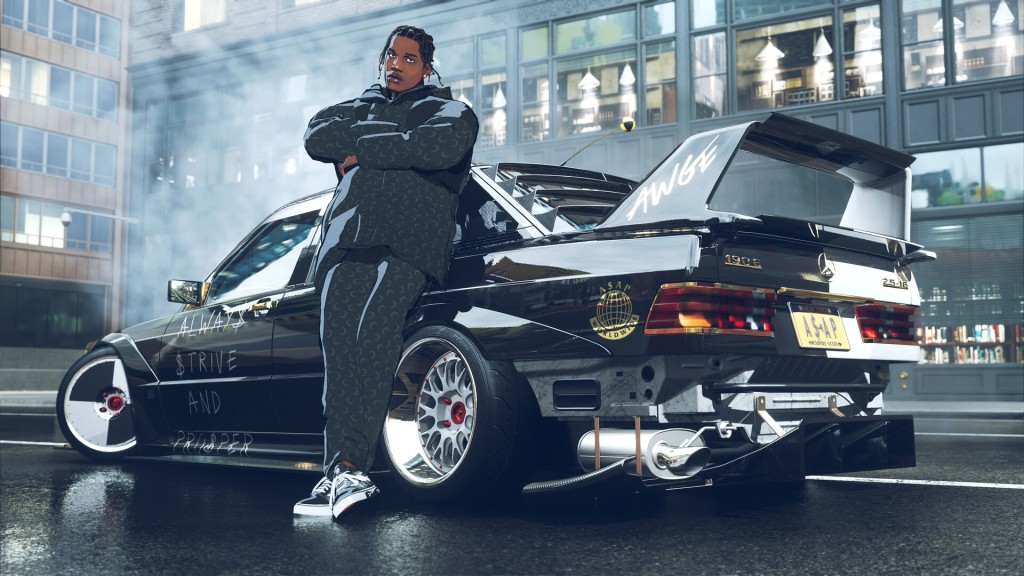
The roads are littered with plenty of stuff to do, from Speed Traps to Drift Zones. The actual race meetings also play host to a couple of event types. Circuit and point-to-point races are obviously the majority of what’s offered, but there are drift events and special Takeovers where you score points by drifting, smashing, boosting and jumping.
Unbound has got a pretty cool structure for its campaign where you have to complete four qualifier rounds to compete in a big tournament. There’s one qualifier per week and each one requires a higher tier of vehicle, so the goal is to win races throughout the days and nights to build up cash and use it to either upgrade an existing ride or buy a new one. And many of the races you enter have a buy-in cost, meaning if you do poorly you can actually end up losing money. Compounding this is the fact that the chosen difficulty limits how many restarts per day you get. I really like this structure and think the concept works best when you ramp up the difficulty because that means the big payouts come with a real risk of losing a huge chunk of your bank.
Best of all, Unbound doesn’t feel like it was designed with winning every race in mind. It can be a genuinely tough game thanks to police presence or the fact that your car just may not be up to spec, although sometimes it’s because the rubber banding is a little excessive. Like, seriously, I’ve seen AI suddenly catch up from nearly a mile behind and boost past me while I’m already doing 250mph. The point is, you don’t need to win every race you just need to make sure you’re bringing in cash so that you can pay for the qualifier and make sure your ride is good enough. I like this because so many other racing games base all of their progression on winning, and while that’s fine it doesn’t really gel with the basic premise of starting with nothing and building toward the Grand. Here, the game can have you lose some races while still letting you move forward.
They’ve kept the idea of the gameplay being split into night and day from Need for Speed: Heat. However, I’m not sure why. In Heat the idea was that the day races were entirely legal events, while at night you could hit the streets for some proper illegal racing with big payouts but the added risk of the cops getting involved. It was a pretty interesting idea, but in Unbound ALL the races are illegal, and any Heat you build with the cops transfers over to night until it resets when you end the day. That makes the day/night system redundant, a purely visual change that comes with the added annoyance of having to return to a garage to transition between day and night in order to open up the next batch of events. It’s a little cumbersome.
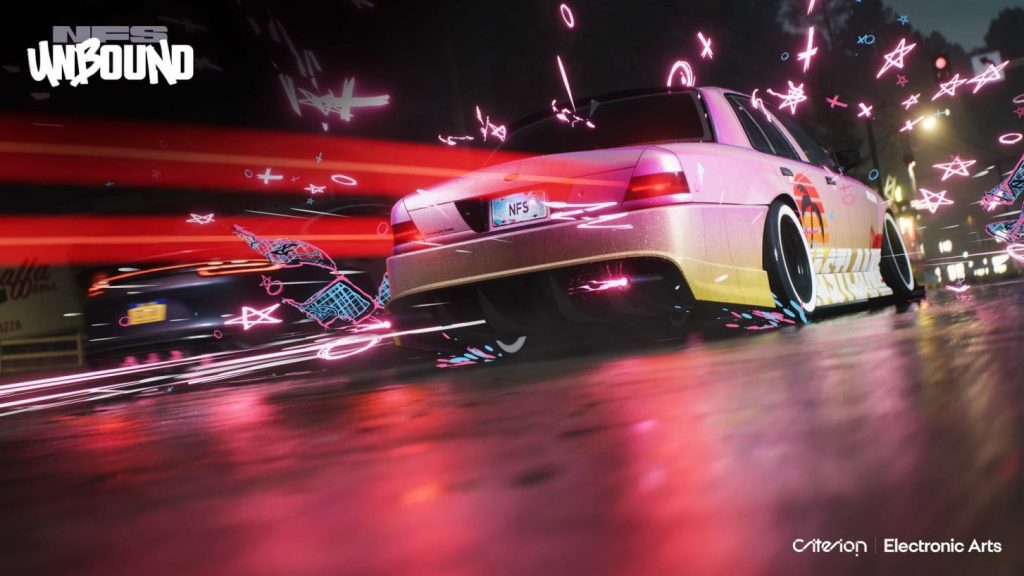
Speaking of the cops and generating Heat, evading the long wheelbase of the law is a pretty big part of being a street-racing hooligan. Five Heat tiers determine just how seriously the police are taking you, with the first tier dispatching basic cars and the fifth unleashing helicopters and chunky 4x4s to fuck up your life. To escape you need to get out of visual range, or in the case of the flying pigs either run them around until they have to refuel or find some cover to confuse them. They are present during races too, and even once you cross the finish line the chase may continue. They’re actually pretty challenging to escape, requiring some fancy driving, so there is a fun risk and reward mechanic at play when it comes to deciding whether to do another race or head to the garage to bank your earnings. However, some chases can become a real slog on those higher tiers, just a seemingly neverending loop of sliding through corners, trying to hide in tunnels and cursing the magic ability of the police to be faster than your highly tuned beast in a Crown Vic.
Need for Speed: Heat had a fun system wherein the more the cops were after you the more XP you’d earn, and it’s a shame to see Criterion ditch it. It made being stubborn rewarding, and although Unbound tries to replicate the risk vs reward concept using money it doesn’t work as effectively. Most of the time it feels like staying on the streets with tier-5 heat just isn’t worth the hassle. Some events need a certain Heat rating to enter them, but you can usually gain enough dosh without them and head back to the garage before having to worry about police helicopters appearing out of nowhere.
The other idea that Unbound retains is splitting the handling into drift and grip, or in other words, do you want to slide around corners or take the racing line? The first option is, to my mind, easily the best, not least because even with maximum grip and downforce, cars tuned for grip always seem to suffer from understeer. It only takes a tap of the brake or accelerator (don’t worry, you can disable one or the other to help stop accidents) to send cars sideways into corners and it’s easy to guide a long drift through the apex, though it does seem like the game will decide to just end a slide whenever it wants. By the time the S-tier rides arrive, it becomes apparent that tuning for grip is the best method for pure speed as drifting loses too much momentum, but I still found myself leaning more heavily into drifting around bends like I’d drunk a bottle of vodka and decided to go for a spin.
Whichever method you opt for, cars are constantly building up their supply of nitrous. More important is the boost nitrous that you fill by sliding, close calls, jumps or performing grip turns. Each filled far is a huge burst of speed accessed by tapping a button, and using burst boost when all three bars are full throws the car forward. The catch is that this special nitrous burns away after just a few seconds, so you’re encouraged to use it as soon as you have got it. Taken down a cop? Use those three bars! Exiting a corner with bar full from drifting? Hit the button! I like that push to make you a reckless racer going as fast as possible at all times, which is further emphasised by tracks featuring long stretches of road where you’re flat-out, weaving through traffic and only barely making turns. These are the kind of events where hitting the brakes almost feels like a failure.
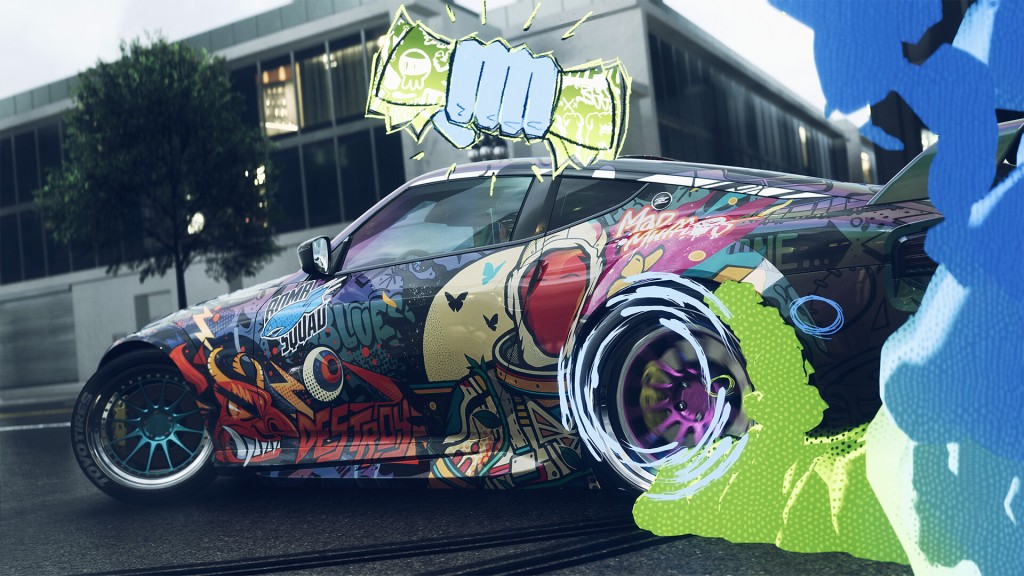
But what I like most about the Burst Boost system is how it impacts drifting. Whenever you pop a bar it instantly alters the car’s trajectory, so if you’re sliding out a bend and realise the angle is going to carry you into a car you can hit the boost and use it to quickly change direction. As you get better at the game you can use this more and more to slam into other racers, avoid dangers or just take the corner a little sharper.
It wouldn’t be a Need for Speed game without a garage full of rides to customise and drive. In total, Unbound offers 142 cars to choose from, a substantial list that spans a good selection of companies and eras, from the ’55 Chevy Bel Air to the 2021 Mercedes-AMG GT Black Series. A couple of these are variations of the same car, but overall it’s a really solid selection and almost all of them have at least a few customisation options in terms of bumpers, hoods, spoilers and other nonsense, although a couple of them have absolutely no modding options outside of paints and underglow. Overall, I think there are enough cars, parts and paint options to build up a collection of cars that feel like they are unique to you, and the excellent paint suite means idiots like me can head straight to the community tab to mooch off of other people’s creative brilliance.
With that said, the absence of a few brands is a bummer. The biggest of the bunch is Toyota who decided they no longer wanted their cars to be associated with underground racing. That, of course, is entirely their prerogative, but it means we don’t get to mess about with the classic Toyota Supra.
Racing games have been trying to slide stories into the on-track action for years now with almost universal failure. The genre just doesn’t lend itself to complex storytelling. Need for Speed: Unbound gives it a shot, too, weaving a tale of friendship, betrayal and family into the races like they stole a Fast & Furious script, even going so far as to reference the increasingly insane franchise. The result? Bloody terrible.
Here’s the basic rundown: your nameless, customisable character and Yaz are both products of the system taken in by Rydell, a former street racer who runs a garage catering to the underground racing crowd. After spending a while working on an old junker Rydell had laying around, you and Yaz start hitting the streets and making a name for yourselves, but Yaz starts to get caught up with a name from her past which eventually leads to Rydell’s garage being burgled and Yaz speeding off with your car. A few years later, you give a lift to a bubby girl named Tess and as you drop her off at a local meet Yaz makes an appearance with your stolen car, hyping up an event named the Grand The plan? Enter, win, beat Yaz, and get the car back.
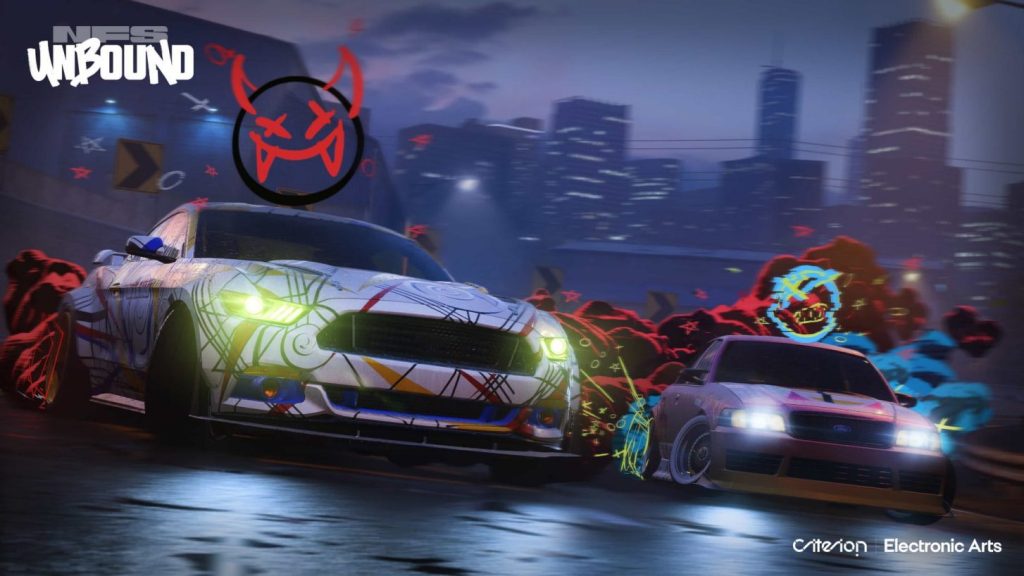
It’s the dialogue that really kills the enjoyment. It’s like someone spent a day on Tik Tok and fully believed that people actually speak that way. Constant quips, awkward references and characters with personalities shallower than the Kardashians are enough to make your earholes bleed like they’ve been raped. It’s a shame because I do think there’s actually a pretty solid, simple story about found family, betrayals and forgiveness buried underneath it all. If they had toned down the painfully cringey dialogue, focused more on building the core characters and maybe allowed you to spend more time with Yaz and the car before they ditched, it could have worked.
There’s also a weird little subplot going on in the background via radio interviews that focuses on the political landscape of the city. It’s more like a parody with a bunch of caricatures fighting it out for the role of Mayor, with many of them berating the street racing culture. But it’s a bit of a tonal mess because while your characters bitches about the politicians and police trying to clamp down on street racing instead of focusing on bigger issues, you’re usually sliding sideways at 120+mph through a crowd of people or crashing into cars. Let’s be honest, you are, in fact, a pretty big problem that’s causing untold damage and endangering hundreds of people. It’s a little hard to emphasise with a bunch of whingey bitches who claim being arrested for barreling through city streets at 200mph is somehow taking away their freedom.
You can evade all the angst by heading online where cringe-inducing dialogue is replaced by a bunch of random folks, of which at least one will actively be claiming they want to pork your mum. As you would expect racing online comes with its own set of fun challenges, ranging from clean racers to psychopaths that will try to use you as their own personal bumper. In other words, it’s a lot of fun, but it’s also a fairly barebones effort. Worst of all, your singleplayer progress and your multiplayer progress are mostly separate. Your garage of patiently crafted eye sores doesn’t carry across so you have to rebuild your whole collection from the start. That’s okay if you skip the career mode, but if you don’t then it’s a real bummer to spend 30 hours tinkering with rides and then have to do it all over again.
For a game with very little fanfare and seemingly no confidence on EA’s behalf, Need for Speed: Unbound is actually an excellent surprise. It’s nothing special, but it is a really solid, very fun arcade racer. The franchise has been struggling to find any traction for years, so it’s such a pleasure to see it find some grip and actually get off of the starting line. Really, the most surprising thing is just how closely Criterion has stuck to the formula that Ghost developed and the result feels like a direct sequel to Heat. Considering that Criterion has established such a strong identity for itself, I was expecting any new Need for Speed from them to be completely different to the last few entries, and yet that’s not the case.
Anyway, if you’re looking to customise some cars and drift them round bends, Need for Speed: Unbound is a good time. Welcome back, Need for Speed, you were missed.




